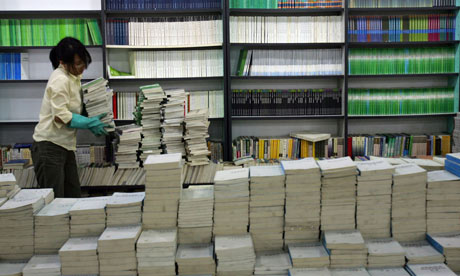Puntastic success ... Stacking shelves at a Beijing bookshop.
Photograph: China Photos/Getty Images
After spending eight years translating the first third of James Joyce's
famously opaque novel Finnegans Wake into Chinese, Dai Congrong
assumed it was a labour of love rather than money. The book's language
is thick with multilingual puns and brazenly defies grammatical
conventions. It begins: "riverrun, past Eve and Adam's, from swerve of
shore to bend of bay, brings us by a commodius vicus of recirculation
back to Howth Castle and Environs."
So the 41-year-old professor
at Shanghai's Fudan University was incredulous when the translation
became a surprise bestseller in China
after hitting shelves last month. Backed by an elaborate billboard ad
campaign, the first volume of "Fennigen de Shouling Ye" sold out its
first run of 8,000 copies and reached number two on a prestigious
bestseller list in Shanghai, second only to a biography of Deng
Xiaoping. Sales of 30,000 are considered "cause for celebration"
according to Chinese publisher Gray Tan, so 8,000 in a month has made
Joyce a distinctly hot property. Ian McEwan, for instance, is considered
pretty buzzy in translation, but the print run of Atonement was only
5,000 copies.
"At first I felt very surprised, and I feel very
surprised now still," says Dai. "I thought my readers would be scholars
and writers, and it wouldn't be so popular."
She traces her love
of Ulysses back to her time as a doctoral student at Nanjing University
in the late 90s – the novel was first translated into Chinese in 1995.
With some prodding from her academic adviser, she decided to tackle
Finnegans Wake in 2004 and signed a translation contract with a publishing agency two years later.
Joyce
is a recent arrival to China. His work was shunned as bourgeois western
literature under Mao Zedong – A Portrait of the Artist as a Young Man
wasn't translated into Chinese until 1975, a year before Mao's death.
And not for lack of demand. When a Chinese version of Ulysses hit
shelves just under 20 years later, it promptly sold 85,000 copies.
Dai
ventures that Chinese readers may appreciate Joyce's rumination on the
cyclical nature of history, the relationships between his male and
female characters, and the sheer challenge of interpreting his prose.
She describes translating Joyce's famous stream-of-consciousness writing
style as an enormous challenge.
The things I lost are mostly the sentences, because Joyce's sentences
are so different from common sentences," she says, adding that she
often broke them up into shorter, simpler phrases – otherwise, the
average reader "would think that I just mistranslated Joyce. So my
translation is more clear than the original book."
Yet she took
great pains to remain as faithful to the original as possible. "For
example, there was a phrase in Finnegans Wake that said 'sputtering
hand', which might mean shaky. If I translated it as 'shaky hand', that
would be OK – in Chinese it's a good sentence. However, I just
translated it as 'sputtering hand'. Sputtering and hand cannot be put
together in Chinese grammar, but I put the two together anyway."
Dai
was originally cowed by the scale of the undertaking – the French
translation took 30 years to complete – and occasionally considered
quitting. "It is a kind of torture," she said. "In China, translation is
not regarded as an academic achievement – I have to publish first, and
then give my own time to translation."
She often quarrelled with her husband (he wanted her to go to bed;
she wanted to stay awake and translate), and was driven to distraction
trying to balance the project with family. "My body suffered from the
work, working every night," she said. "I looked older than I should be.
My eyes became dark, and my skin wasn't that good either."
Her
contract covers the remaining two-thirds of the novel, and despite the
long hours, she has no qualms about continuing. "I think it's a very
great book – after I read Finnegans Wake… I'll think oh, this writer
used a sentence that's too traditional, too simple, and if he can
experiment more with his sentences then he might be able to express
different things."
"Finnegans Wake made me believe that Joyce is a
writer who is never satisfied with what he's already accomplished," she
continues. "His spirit is very strong."
That is one thing they have in common.
dari http://www.guardian.co.uk/books/2013/feb/05/finnegans-wake-china-james-joyce-hit





